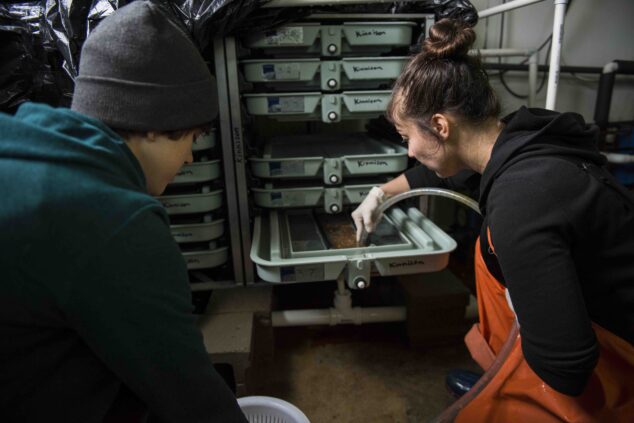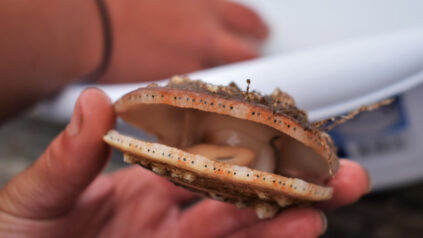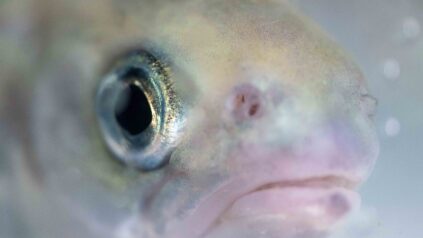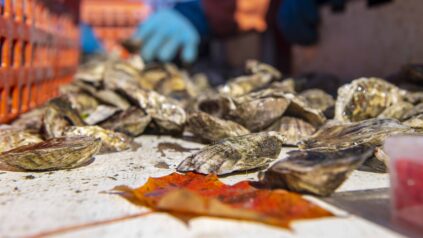
RESEARCH COLLABORATIONS

USDA-ARS Collaboration
Over the past decade, Maine has seen 2.2% annual growth in aquaculture, which has had an overall economic impact of $140 million annually. Tackling the growing challenges for the sector — from emerging finfish and shellfish diseases to the effects of climate change — is critical.
To address these issues facing the industry in Maine and the nation, an Aquaculture Experiment Station has been established by the University of Maine Aquaculture Research Institute (ARI), in partnership with the U.S. Department of Agriculture Agricultural Research Service (ARS) and Auburn University.
“Maine has been a leader in the development of sustainable aquatic farming practices for many years. Those progressive methods are founded on science and innovation. This cooperative agreement is a great example of the effectiveness of public-private partnerships between the University of Maine, USDA and the aquaculture sector. The work that the Aquaculture Research Institute and USDA National Cold Water Aquaculture Center does is critical to the continued growth, sustainability and competitiveness of the Maine aquaculture sector,” said Sebastian Belle, executive director of the Maine Aquaculture Association.
The cooperative research and development agreement, eligible for renewal every five years, is funded by $950,000 from USDA ARS for the first year, and $750,000 annually thereafter. The Aquaculture Experiment Station will harness the expertise of ARI-affiliated faculty in Orono and at UMaine’s Darling Marine Center in Walpole, and ARS researchers based on the Orono campus and at the National Cold Water Marine Aquaculture Center in Franklin. The collaborative agreement also includes shellfish researchers at Auburn University in Alabama.
ARI faculty members Deborah Bouchard, Damian Brady, and Paul Rawson work at a national level in aquatic animal health, shellfish genetics and intelligent farm siting. As researchers in the Aquaculture Experiment Station, the three UMaine experts will expand their work to address USDA-ARS priorities, such as alternative feeds for finfish, selective breeding in oysters and “off-flavor” in salmon meat. The experimental station will allow researchers to provide rapid response to industry in a farm and hatchery setting. New research initiatives, focused on genetic improvement of North American Atlantic salmon and the Eastern oyster for aquaculture production, advance the goals of localized selective breeding strategies that improve performance for economically important traits, including growth and disease resistance.
“The research proposed by UMaine and USDA-ARS is being driven by input from industry and stakeholders,” said Research Leader and Center Director of the National Cold Water Marine Aquaculture Center Brian Peterson. “The new collaboration will allow scientists to focus on emerging diseases, off-flavor, and selective breeding strategies that improve performance of economically important traits such as growth disease resistance.”
About the USDA Agricultural Research Service
The Agricultural Research Service (ARS) is the U.S. Department of Agriculture’s chief scientific in-house research agency. ARS has a mission to deliver scientific solutions to national and global agricultural challenges – some of which affect Americans every day from field to table. The Agency also delivers cutting-edge, scientific tools and innovative solutions for American farmers, producers, industry, and communities to support the nourishment and well-being of all people; sustain our nation’s agroecosystems and natural resources; and ensure the economic competitiveness and excellence of our agriculture.

Scallop Research Collaborative
The Scallop Research Collaborative (SRC) aims to understand the scallop resource, fishery, and industry in the changing ecosystem of the Gulf of Maine by producing integrated research programs and providing direction for future collaborations. The SRC will establish a framework to develop research priorities and initiate collaborative projects focusing on the Gulf of Maine scallop resource.
For more information: Scallop Research Collaborative Page




